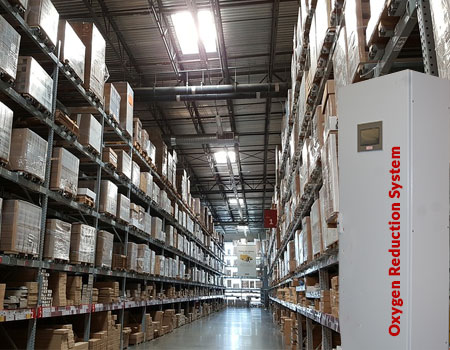How a Warehouse Oxygen Reduction System Works?
The system continuously reduces and maintains the oxygen level within the warehouse to around 15-16%, just below the threshold needed for most materials to ignite and sustain a fire. This oxygen level is still sufficient for humans to breathe safely, allowing normal warehouse operations to continue without interruption.
Oxygen Concentration Reduction:
Nitrogen, which makes up about 78% of the air we breathe, is the key element used in this system. The system generates nitrogen using on-site nitrogen generators, which separate nitrogen from the other components of the air (primarily oxygen). The nitrogen is then introduced into the warehouse air, effectively diluting the oxygen concentration.
Nitrogen Generation and Distribution:

Sensors strategically placed throughout the warehouse continuously monitor the oxygen levels to ensure they remain within the desired range. The system automatically adjusts the nitrogen flow as needed to maintain consistent oxygen levels, even as warehouse activities might introduce changes in air composition.
Continuous Monitoring:
-
The oxygen reduction system can be integrated with other warehouse management systems, including ventilation, HVAC, and fire detection systems. It works seamlessly with these systems to ensure optimal performance and safety.
System Integration:
Key Features and Benefits:
By reducing the oxygen concentration, the system effectively prevents fires from starting, providing a proactive approach to fire safety. This is especially important in warehouses where flammable materials, such as paper, chemicals, or textiles, are stored.
Fire Prevention:
Unlike traditional fire suppression systems that might use water or chemicals, an oxygen reduction system prevents damage to goods by avoiding the need to activate suppression agents. This is particularly beneficial for protecting sensitive or high-value items that could be damaged by water or chemicals.
Protection of Goods:
Sensors strategically placed throughout the warehouse continuously monitor the oxygen levels to ensure they remain within the desired range. The system automatically adjusts the nitrogen flow as needed to maintain consistent oxygen levels, even as warehouse activities might introduce changes in air composition.
Safe for Human Occupancy:
-
The system is designed to maintain oxygen levels that are safe for humans, allowing workers to perform their duties without any health risks. In the event of an emergency, normal evacuation procedures can be followed without additional complications related to oxygen deprivation.
System Integration:
-
Modern systems are designed to be energy-efficient, with minimal impact on overall warehouse operating costs. The nitrogen generation process is optimized to use energy effectively, reducing the environmental footprint of the system.
Energy Efficiency:
-
The system operates continuously, providing round-the-clock fire prevention, even when the warehouse is unoccupied. This constant protection helps to ensure that stored goods are safe at all times.
24/7 Protection:
Scalability and Customization:
By reducing the oxygen concentration, the system effectively prevents fires from starting, providing a proactive approach to fire safety. This is especially important in warehouses where flammable materials, such as paper, chemicals, or textiles, are stored.
Applications:
Warehouses storing valuable goods, such as electronics, pharmaceuticals, or art, benefit from the protection offered by an oxygen reduction system.
High-Value Storage:
Facilities that store flammable materials, such as chemicals, paper, or textiles, are ideal candidates for this type of system.
Flammable Materials Storage:
Oxygen reduction systems can also be used in cold storage environments where fire risks must be minimized without affecting temperature-sensitive goods.
Automotive Parts and Tire Warehouses: Reducing fire risks in warehouses storing tires, lubricants, and other automotive parts is crucial, as these materials can be highly flammable.
Cold Storage Warehouses:
-
Prevention vs. Suppression: Unlike suppression systems that activate after a fire has started, oxygen reduction systems prevent fires from occurring in the first place.
Advantages Over Traditional Systems:
-
There is no risk of water or chemical damage to stored goods, making it ideal for protecting valuable or sensitive items.
No Residual Damage:
-
The system's continuous monitoring and control of oxygen levels reduce the likelihood of false alarms, which can be disruptive and costly.
Reduced Risk of False Alarms:
Considerations:
Initial Investment: The installation of an oxygen reduction system can be more expensive than traditional fire suppression systems, but the long-term benefits of fire prevention and asset protection can justify the cost.
-
Maintenance Requirements: Regular maintenance is needed to ensure the system functions correctly, including monitoring nitrogen levels, checking sensors, and performing system diagnostics.
-
Training: Warehouse staff may need training to understand how the system operates, including safety protocols in the reduced-oxygen environment.

.jpg)
.jpg)
.jpg)